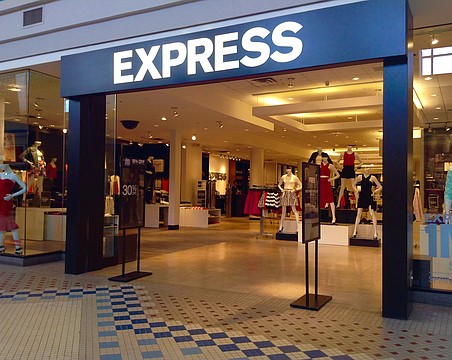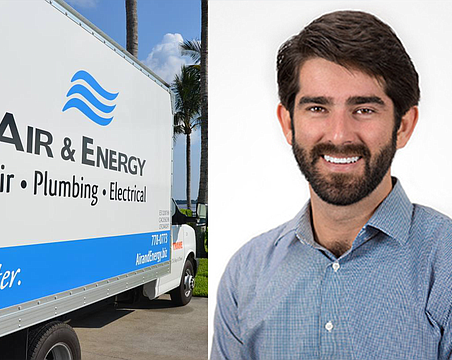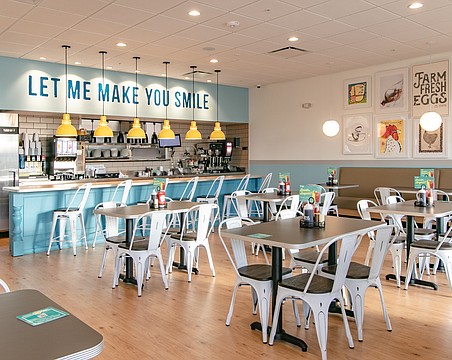Killer Tomatoes
By Jean Gruss | Editor/Lee-Collier
The supermarket wars are heating up and traditional grocers such as Publix and Albertson's are facing competition from two sides.
On one side is mammoth discounter Wal-Mart, which is selling food for less money through its supercenters and neighborhood markets. At the other end, upscale purveyors such as The Fresh Market are stealing from mainline grocers' most profitable areas, such as fresh produce and meats.
The Review caught up with Brett Berry, chief operating officer and executive vice president of The Fresh Market, based in Greensboro, N.C., as he was opening a new store in Bonita Springs recently. Berry outlines his company's strategy in Florida, sizes up the competition and discusses some of the rapid changes in the industry. Here are excerpts of the interview with Jean Gruss, the Review's Lee-Collier editor.
What is your growth strategy in Florida?
In general for the company, we're shooting for about a 20% unit growth per year. Where those fall in geographic regions is a little shoot and miss, but there's a disproportionate amount of growth in Florida. For us, Florida has been just a fantastic state and market. Both the east coast and the west coast. We have a larger presence on the east coast, and there are a number of reasons for that, most of which is due to the availability of sites and the density of people. However, we are very interested in continuing to grow up the Gulf Coast. We started in Naples, and it continues to be one of our very favorite stores. It opened in April 1998. I think the lifestyle here, the Midwest focus, the slower, kinder lifestyle really bodes well. Our concept is all about slowing down and enjoying the experience of food shopping. On the West Coast we first opened in Naples, then up in Clearwater, now in Fort Myers and Bonita Springs. As far as future growth, this is absolutely fertile territory. We'll open a number of stores this year. We have a store going in Wellington. We have another store next year in North Naples. I think Florida should meet and exceed the 20% annual rate. The demand is out there.
What attracted you to Florida?
It was a natural progression. Our first foothold was in Jacksonville. My family has a house in Naples, and we knew it very well, liked it and found great real estate. It was like most good things in life; it was kind of purposeful and kind of happenstance. At that time we underestimated the growth in this market. We never thought it would grow at 30% population like it has.
How is the Florida market different from the North Carolina market?
There are differences, but they're dissipating every year. As people move more and barriers between different geographic regions are razed through technology, the differences are downplayed. Now it's nothing for people to live here and have lived in New York, Chicago or Milwaukee. That said we wouldn't sell winter roasts here like we do in the colder regions. But by and large, because or customers are so homogeneous, they'll typically go after the same things.
Can you tell us about other areas you're looking in Florida?
I'd love to be in the Panhandle. I'd love to be in Destin. There's lots of fill-in on the east coast. I'd love to be in Sarasota; I think that could hold a number of stores for us. Gainesville too. Florida is so fertile.
Publix has long dominated Florida with quality service. How do you compete against Publix?
Publix is a great competitor. They're one of the few of the large-scale competitors that are privately held, which give them a lot of freedom to do things that our other competitors can't do. They do provide their customers a good experience, and they tend to treat their employees pretty well. The way we compete against them is through the strength of our concept and better execution. Our typical store is about 20,000 square feet and their stores are 40,000 to 50,000 square feet. And our focus is different. Publix has to be everything to everyone, because they have to compete against Albertson's and Winn-Dixie. Our concept: We're not everything to everyone and in fact I'm happy not to be everything to everyone. Because of that, it gives me a corner from which to compete. Publix can't afford to just compete against me. We focus on what we do well, which is great execution, superlative service, the right mix of good products with the emphasis on perishables, and a clean, relaxed and intimate environment.
What exactly do you mean by perishables?
By that I mean the perimeter of the store. Produce, seafood, meat, bakery, deli, and cheese. We also try to emphasize our notion of value, which is not just cost like Wal-Mart. It's where quality and cost cross each other.
What won't you find here that you can find at Publix?
We have a limited assortment of groceries. You can't buy diapers here. You can't buy detergent, which take up a lot of square footage in other grocery stores.
How do you get customers who want to buy diapers and detergent to come to your store too?
Everybody, including myself, has to shop somewhere else. We focus on being the very best at what we do, which is perishables. The other grocery stores don't have as good a selection and as good a value-as defined by product quality-so people who value their perishables will come here. What happens over time is that they'll make the majority of their trips here and then they'll make their one weekly trip to Publix or Target.
Do you view Wal-Mart in the same light as Publix?
I view everyone who takes a share of your stomach as competition. So that includes all grocers and all restaurateurs. Wal-Mart's Supercenter is on one end of the spectrum, and to say that we don't compete against them is probably disingenuous. However, they're serving a different niche. And the niche that they serve they do very well. With their neighborhood store, I think they're trying to figure out where they're going with that. The way we compete against them is the same way we compete against Publix, which is by sticking to our knitting and doing what we do the very best we can.
What about Whole Foods? Are you competing for sites with them?
On the competitive spectrum, they're much closer to us than most others. I have lots of respect for them. They're a well-run company. They've taken a slightly different approach in their store model and changes in that model. They've gone to very large store plans. They're opening a lot of 60,000 to 70,000-square-foot stores, which are significantly bigger than the stores they were opening two or three years ago, which were 30,000. With that shift in emphasis, they have to put more things inside of their stores.
They were once just focused on their core philosophy, which is health food oriented. Now they've expanded to be something else. And what that something else, is I'm not exactly sure.
We try to create an intimate, convenient place to shop with the fact that we're only 20,000 square feet. At 70,000-square-feet it's just a different shopping experience. It's an impressive store, but the shopping experience and the effort required to shop is different.
They're a public company, and their numbers are easily available. They are darlings of Wall Street. Quite honestly what's good for them is good for us. I wish them well because when they succeed, it strengthens vendors and the whole industry. So I want Whole Foods to do well.
Are we competing for sites? Sure. We're generally looking for more or less the same demographics. I think Florida is probably a better demographic for us than it is for them. I think the age of Floridians is more squarely in our store than it is in Whole Foods. Whole Foods does extremely well in inner cities. In the urban areas of Miami they're doing really well. My hat's off to them for figuring out the urban concept. We're less of an urban store, and we tend to attract a slightly older customer. People will go to Whole Foods who believe in their philosophy. People shop us because of the love of food. As people get older and become empty nesters they tend to cook more because it's a leisure activity.
Do you have sales targets for new stores?
We don't have official targets. Rather than managing to a number or target, we'll focus on making sure we're doing the very best we can do then letting the results fall where they land.
Is that an advantage of being privately held?
Yes. The truth is, our shareholders are much more demanding because they know the business. Shareholders and analysts on Wall Street flat-out don't know the business very well. So we make our decisions based on long-term investments, not on quarterly basis.
At its core, that's one of our big advantages over a competitor like Whole Foods and Wild Oats. Whole Foods is a great company, but they're saddled by the heroin of Wall Street. Last week they missed their earnings, and it was like Black Monday over there. Intrinsically, nothing's happened inside the company, and it's causing devastation and disrupting operations, and it's all because they didn't manage their earnings. We don't have to play that game. We're very blessed.
Have you ever considered taking the company public?
We're asked that quite a bit, and bankers want to take us public. But at this very point in time, there's no need for us to do that. To fuel the growth that we're contemplating there's no need to go public.
When you open a new store such as the one you're opening in Bonita Springs, what marketing do you do to get your name out there?
In an area such as Bonita, we have a fairly high-level brand penetration because of Naples and Fort Myers, so our marketing efforts here are less than elsewhere.
Our customer demographics generally are extremely difficult to reach through traditional means of advertising, such as radio and newspapers. They're not motivated by attributes that are levers used in traditional media, such as price. So they're not going to drive a long way to save 10 cents on a can of beans.
If we advertise in the Sunday paper, they let everything fall out and don't typically read it. So we ultimately rely on word of mouth. It's slow in building, and in newer markets it's more costly.
When you're searching for sites from a real estate perspective, what specific things you look for?
Once we get the formula down, it's fairly easy because all of our customers are fairly homogeneous. So the customers that will be in here tomorrow, were they to move to Chicago, they would probably shop our stores there. Because of that, it makes real estate fairly easy. Our demographics are not widespread because we're not everything to everyone. Certainly, education and income are big factors for us. Growth of an area is important to us.
What are the most profitable parts of your store?
You can normally tell what's important to a store by walking its perimeter and then looking at what's right in the middle. Publix is an exception, but with most retailers you can tell what's important to them by looking at what's on the right-hand-side of the store. Publix has a lot of clockwise stores, but most stores in this country are counter-clockwise. The perimeter store is certainly where our bread and butter is. It's the produce, meat, bakery and deli. That's not to diminish at all the importance of our coffee, our bulk foods and our wine department, but that's what really brings people in multiple times a week.
How many times a week on average does your shopper visit your stores?
It changes over time. The typical person in a normal grocery store will shop once a week and load up. When we first start, people are reluctant to change that habit. So they'll start with these huge shopping carts. Then over time, they'll start seeing it works better to shop better like you do in Europe at an outdoor market.
Because the way the store is designed and the small footprint, it's designed to be a convenient place to shop. It's not an onerous, ugly, painful place to shop. It's where two or three times is not uncommon at all.
What do you do to attract good employees?
That's the key to what we do. In our heart and in our soul, we're a service company that happens to sell groceries. So people are the core of what we do. So in attracting people, we try very hard to sell them on who we are and what we're about. It's a hard sell, but we take a lot of time with people. Everyone in upper management in the company has some type of service background. It's selling on the blue-sky opportunities, selling them on the ethical treatment of people. We don't burn people and we don't burn through people. We say what we mean and we walk our talk.
When you look at the industry overall, there are companies like yours on the upper end of the scale and the Wal-Marts pushing from the bottom. What's the future of mainline grocers like Publix, Albertson's and Winn-Dixie?
They have a fight ahead of them, because right now they're monkey in the middle. But I don't see them going away because they have one thing Wal-Mart doesn't have: real estate. Real estate is very, very important. So what these traditional-format stores need to figure out is who they want to be, and they have to go after what they want to be. I don't think all the traditional players will be there, but there is room for strong players who know what they're doing. And that's simply because of real estate.
AT A GLANCE
The Fresh Market
Headquarters: Greensboro, N.C.
Ownership: Privately held by the Ray D. Berry family
2005 Revenues: $450 million
Founded: 1982
Number of stores: 54
Store size: Average is 18,400 square feet
Store employees: Average is 100 per store
Product emphasis: Perishables including meats, seafood, fresh fruits and vegetables; bakery, deli and cheeses.
Future Florida store openings in 2006 (dates are tentative): Wellington (May 17), South Tampa (October 11), Gainesville (October 11), North Naples (December) and Destin (December.)





